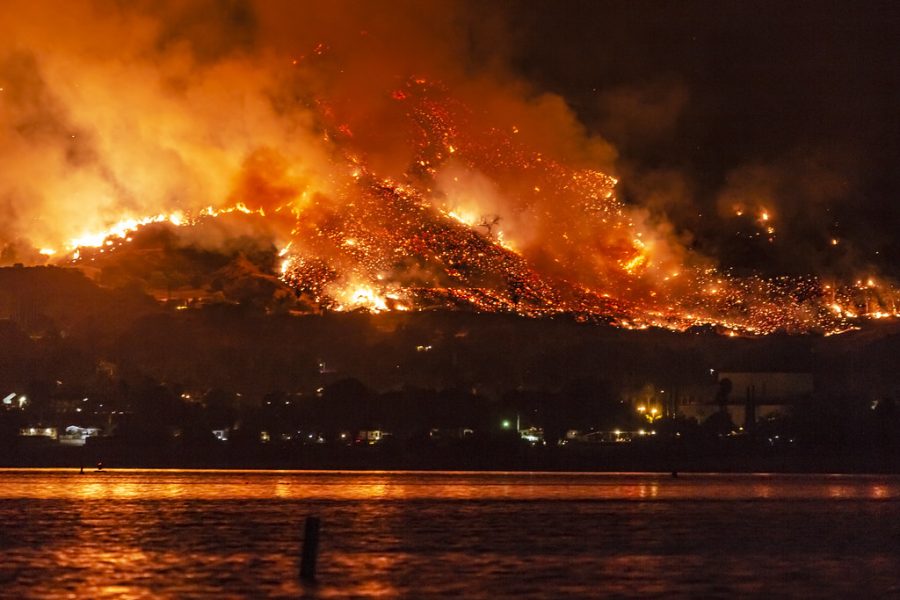Efforts to Combat Global Warming Aren’t Global Enough
The signs of global warming are here, and many countries are preparing to take action. But is it enough?
Due to rising global temperatures, wildfires are burning hotter, longer, and more often, making places that were once safe prone to deadly conditions, according to NASA.
February 2, 2022
In 2020 alone, four million acres of land was burned to a crisp in California, along with 10,000 structures and 33 lives lost according to the government of California. While wildfires are common in California, they shouldn’t be this bad. Scientists have warned us about the catastrophic effects of global warming for decades, and have been largely ignored. Now, we can see the consequences of this, and it is not looking pretty. A study by the University of California concluded that Venice is sinking, California and Australia are burning, and winter storms are getting so deadly that people are freezing to death in the streets of Chicago all because of global warming. Because of rapid rises in global temperatures, we are facing a 6th mass extinction in which billions of species such as polar bears, penguins, and koalas will go extinct.
The United Nations stated that there are only 11 years left until the effects of global warming are permanent. World leaders have been informed that it is do or die at this point,“we are the last generation that can prevent irreparable damage to our planet,” General Assembly President María Fernanda Espinosa Garcés said during a UN press conference in 2019. Many are implementing new policies such as going carbon neutral by 2050 and keeping global temperatures from rising two degrees celsius to keep the Earth at a livable temperature. But the big question is: are these measures enough?
To start, we need to dive into what policies are being put in place to combat global warming. Countries in Europe are at the forefront of keeping climate change from getting out of control. According to the Imperial College of London, Norway, Sweden, France, and the UK are all pledging to go carbon neutral by 2050. The US has set this same goal, along with pledging to make the electricity sector carbon free by 2035. China, the world’s largest carbon emitter, has pledged to go carbon neutral by 2060. The United Nations Framework Convention on Climate Change (UNFCCC) stated that 195 countries are part of the Paris Climate Agreement, which aims to keep global warming well under control by preventing global temperatures from increasing past two degrees Celsius. In theory these all sound great, but I have a hard time believing that these goals are enough or that most of the countries listed above are on track to reach their goals.
“There is nothing wrong with setting that kind of goal,” environmental science teacher Rama Srinivasan said. While this goal is solid, we are taking our sweet time reaching it. It is the year 2021, and almost every country in the world has set a net zero emissions goal aimed for this to be accomplished by 2050 or later, making it a minimum of 29 years before even hitting that goal. Do we even have that kind of time? Srinivasan doesn’t think so, “It is too far in the future.” By 2050 there is a good chance that the Earth will have already heated 2 degrees or more.
Despite the incredible progress of a few countries, such as India who has doubled their renewable energy production, and Norway who is on track to reach zero carbon emissions well before 2050, most still have a long way to go before even coming close to meeting the goal of keeping the Earth’s temperature from rising 2 degrees celsius. For example, Russia, which is the fourth largest carbon emitter, failed to commit to going carbon neutral at any point in time. Russia went so far as to not attend COP26 in Glasgow. According to Investopedia, Russia is responsible for releasing 1.71 billion metric tons of carbon annually. This is mainly because they have refused to invest in renewable energy and continue to heavily rely on coal. Along with this, a few countries that have made commitments to net zero emissions, such as the UK and China, are seriously behind their targets. In order to stand a chance against global warming, everyone has to work together, especially larger emitters such as Russia.
While it should be noted that Russia is extremely reliant on coal and to stop using fossil fuels would have a massive negative impact on their economy according to the U.S. Energy Information Administration, it does not outweigh the long term effects in which the economy will be the last of our concerns. Though it would be extremely expensive to move to renewable energy, Russia is more than capable of making the switch and if needed the UN can always provide monetary support.
Due to these ineffective measures, climate change looks to be an unceasing issue in the future. “No, we are not doing enough,” Srinivasan said, “because there is also not enough awareness about it.” In order to survive, people need to be educated on such topics and spread awareness in order to save the planet. First world governments have to make the push, starting with the U.S. “We [The US] have been in the forefront of fighting a lot of the good humanitarian battles. If we want to establish climate change as a priority for the world, I think we should lead from the front.” Srinivasan said. After doing the research for myself and seeing the minimal efforts of especially wealthy countries such as European nations and the US, I have to say I am extremely disappointed. The time to plan was yesterday, the time to act is now.

















![The Phoenix varsity volleyball team lines up for the national anthem. “We were more communicative [with each other] during this game, and I feel like we kept our energy up, especially after the first set,” senior Jessica Valdov said.](https://theblazerrhs.com/wp-content/uploads/2024/10/DSC_0202-1200x800.jpg)








![Junior Alex Alkhal pitches the ball. “[I] just let it go and keep practicing so we can focus on our goal for the next game to get better as a team,” Alkhal said.](https://theblazerrhs.com/wp-content/uploads/2025/05/DSC_0013-1-1200x929.jpg)

























